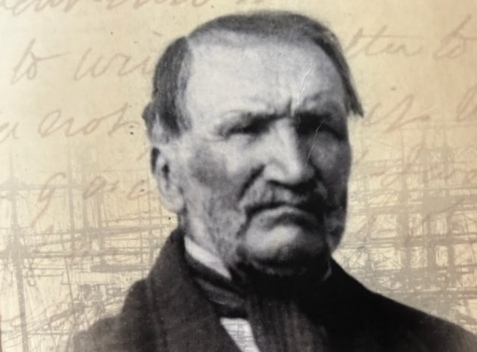
I have been working on a poem about a farm. Or perhaps it is about its tenant for some fifty years from July 1848.
In ten years Joseph Jenkins created a farm that was judged to be the best in the county. He had learned everything there was to know about farming from his father and put that knowledge to good use, becoming prosperous and well liked in the community. He had little formal schooling – apart from some early learning he spent only a couple of terms at a school some five miles from his parent’s farm run by the minister of the church – but he learned to write… and so began a lifetime as a diarist.
Despite his initial successes, life on a Welsh farm was hard in the 1800s – he regularly rose before dawn to walk the fields and hedgerows and, although they employed house staff and farm workers both he and his wife worked from dawn until dusk. His successes brought him into contact with the local squirearchy and this in turn led to time away from the farm. Too much time away, particularly as much of it was spent in local hostelries. He repeatedly signed The Pledge but seemed unable to free himself of his liking for drink. Life on the farm became harder… to the extent that on several occasions his wife left him and returned to her father’s farm, sometimes some of the children went too. This seemed entirely wrong to Joseph who felt that he was no longer master in his own house and when, on another occasion, his wife searched his pockets for money from the sale of stock, his pride took a further blow.
Despite his adventures in local inns, he remained someone of note and lent his support and his voice in support of The Milford Haven and Manchester Line – the M&M Line – which would connect the deep water port in South Wales to the English industrial manufacturing centre. He understood the advantages that the line would bring to agriculture and to the rural economy and gave his full support to the project, often delivering speeches and canvassing for support. He was even invited to address a House of Commons committee on the line’s benefit for rural agriculture. Then, when work began on the line it passed through his farm and the work caused chaos in his fields and ruined his carefully laid hedges.
And so, one December night, some 20 years after he took over the tenancy, he packed two bags and, without a word, walked out of the yard, over the bridge near the entrance to the farm and onto the railway line, walking north to the nearest station. He travelled to Liverpool and took ship to Australia. His diaries for the 25 years he spent there have been published as Diary of a Welsh Swagman. Bethan Phillips’ book, Pity the Swagman, provides the back story and commentary – the image above is taken from its cover.
And then, it seems, he returned expecting to take over the running the farm from his son, almost as if he had never left. Understandably, especially when his old habits returned, the past arguments between husband and wife resurfaced, and life on the farm must have become well nigh impossible for everyone. Within four years the swagman was dead.
My poem, Trecefel, will not see the light of day yet. I am sure further proof readings will generate some editing! Maybe I am not quite satisfied yet!
Joseph Jenkins. Diary of a Welsh Swagman 1869-1894.
Edited by William Evans. Macmillan Australia, 1977
Bethan Phillips. Pity the Swagman: The Australian Odyssey
of a Victorian Diarist. Cymdeithas Lyfrau Ceredigian, 2002